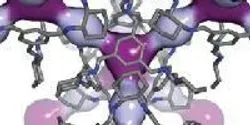News

It may sound strange to say that nuclear weapons must survive radiation. But as part of its mission of ensuring the nation’s stockpile is safe, secure and effective as a deterrent, Sandia National Laboratories must make sure crucial parts can function if they’re hit by radiation, especially a type called fast neutrons.

Each year EAS presents 7 awards to analytical scientists who have distinguished themselves. Learn more about the awards and how to nominate a colleague.

New material traps gases from nuclear fuel better and uses less energy than currently available options.

Several Kansas State University researchers were essential in helping scientists assemble a draft of a genetic blueprint of bread wheat, also known as common wheat. The food plant is grown on more than 531 million acres around the world and produces nearly 700 million tons of food each year.

The U.S. Department of Energy selected a University of Alabama start-up company for an approximate $1.5 million award to refine an alternative material to potentially extract uranium from the ocean.

Perimeter Associate Faculty member Matthew Johnson and his colleagues are working to bring the multiverse hypothesis, which to some sounds like a fanciful tale, firmly into the realm of testable science.













